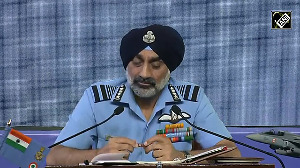Congressional and administration sources were confident on Wednesday night that a procedural snag in the form of a legislative tactic used by House Majority Leader, Republican John Boehner of Ohio would be resolved on Thursday morning, and the compromise legislation worked out by the House-Senate conference committee to facilitate the US-India civilian nuclear agreeement would be approved by both chambers by Thursday night at the latest before the Congress adjourns.
The House and Senate conferees had wrapped things up and completed their work on the compromise legislation and were ready to file it with the House Rules Committee as part of the procedure when Boehner -- one of the Republican House conferees had put a hold on the bill and said he intended to tag on a piece of unrelated legislation to this bill, which is a legislative maneuver used in a lame-duck session to push through amendments by piggy-backing them on larger bills that are poised for approval by the House and Senate.
There was speculation that Boehner had either tried to tag on an immigration provision or an amendment to grant Vietnam permanent normal trade relations, but that the Democrats had flatly refused and said they wanted this conference committee bill to be nothing but legislation that dealt only with the US-India civilian nuclear agreement.
Administration sources told rediff.com that the White House too -- that had been expecting the conference bill to clear both the House and Senate on Wednesday -- had made clear to Boehner that nothing should be attached to the US-India nuclear bill and got the message across that "we cannot lose this bill because of any attachments."
They said the White House had urged him to immediately remove his hold and to allow it to be voted on in the House so that it can then be also adopted by the Senate and sent to the president's desk for signature.
Congressional sources said that Boehner was also being urged by his Republican colleagues in the Senate to release his hold and let the bill be voted on as quickly as possible so that it can be sent to the president for signature.
Senate Majority Leader Bill Frist, Tennessee Republican, said on Tuesday that he had telephoned Prime Minister Manmohan Singh and assured him that India's concerns over certain amendments in the bill would be alleviated and that the legislation would certainly be completed before Congress adjourns.
"I spoke with Indian Prime Minister Manmohan Singh on the telephone regarding the pending legislation to authorise the civil nuclear cooperation between the United States and India," he said, and added, "I assured Dr Singh that one of my top priorities for the remainder of this Congress is to enact this legislation."
Frist said, he had told the prime minister, "I am confident that we will be able to complete Congressional action on it this week."
Meanwhile, administration sources in exhuding confidence that the bill would be approved on Thursday before Congress adjourns, said everything was on tap for a White House signing ceremony on Monday, December 11, where President Bush would sign the bill into law in the presence of the key protagonists in both Houses, who were the prime drivers of the enabling legislation and several Indian-American community leaders and representatives of the pro-India lobby -- including business and industry who were invaluable catalysts in the agreement's passage.
Indian Ambassador to the US Ronen Sen, who is also scheduled to leave for New Delhi on Thursday, hosted several Indian-American community leaders and activists for dinner at his residence to thank them for their strong support in pushing the legislation through the House and Senate by overwhelming margins.
Swadesh Chatterjee, a North Carolina entrepreneur who constituted the US-India Friendship Council in May with the sole purpose of mobilising community support to push the agreeement through in Congress, and also attended the dinner, said he had told Sen when he is in New Delhi to convince the naysayers that this is good legislation that the Congress has come up with and as near perfect a bill as India could expect.
Chatterjee told rediff.com, "I told the ambassador that we've got almost 95 per cent of what we wanted, and that we are not going to get 100 per cent, but that this is a darn good bill and India should be able to live with it and to convince the people there (in Delhi) to accept it."
"We put our heart and soul into this effort to get this legislation through and what a long way we've travelled after the administration proposal was virtually dead in the water in March when it was first proposed and had only five sponsors," he said.
Chatterjee reiterated that he had told Sen "that when he goes to India to convince them over there that they should accept this legislation because it's the best that we are going to get and we should be happy that most of India's concerns have been addressed."





